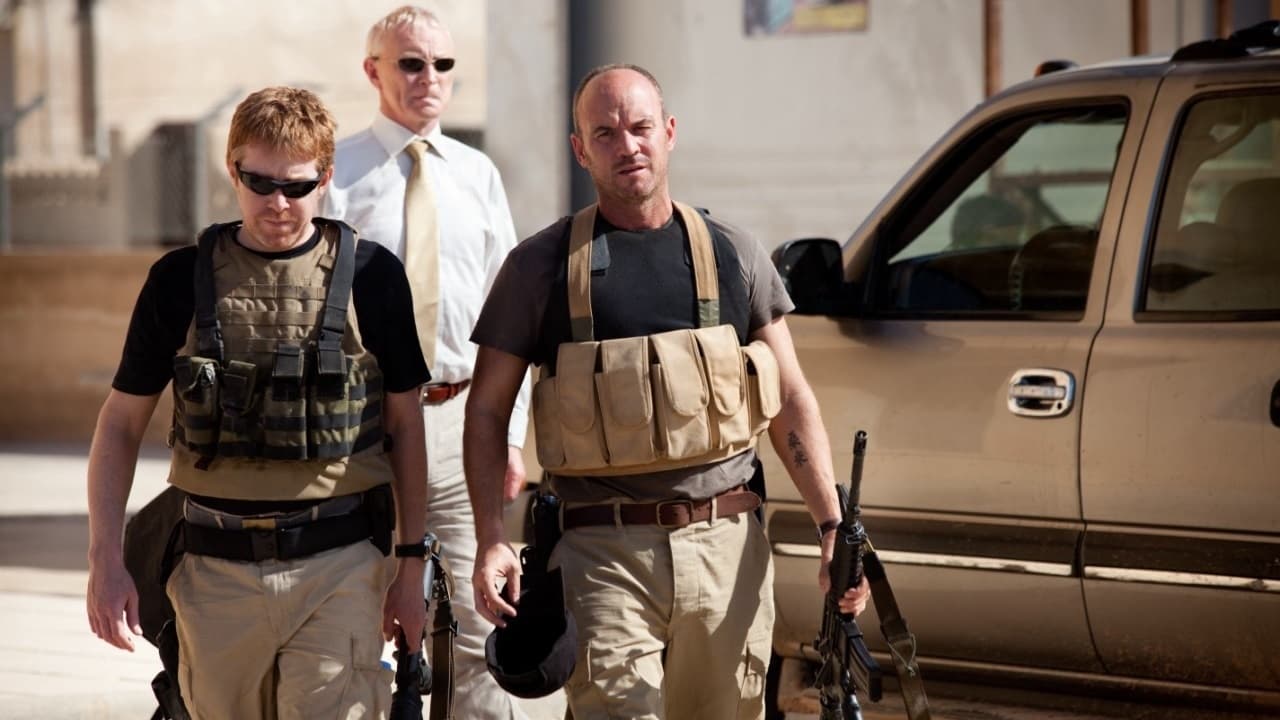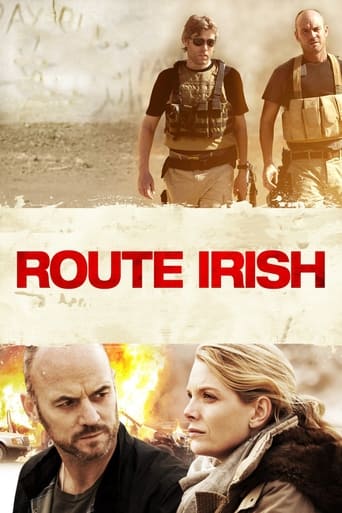

Ken Loach has made some powerful films, but many of his works are about worthy issues rather than being worthy art. He strongly resembles John Sayles in this respect. And like Sayles he demonstrates a concern for the working class, an interest in the fate of socialism, focuses on unions, general strikes, the physical and mental state of the working population and the formations and collapses of various political movements. He's tackled Stalinism, the Spanish Civil War, the suffocation of post war East Germany, the British general strikes of the 1920s, Britain's conflicts with Ireland, the Trotskyist movements of the 60s and early 70s and now with "Route Irish" the West's ongoing wars in the Middle East.Today Loach's films are mostly ignored or struggle to find distribution and/or financing. Back in the 60s, however, he was seen as a major force. His 1966 drama "Cathy Come Home", for example, is generally credited with making homelessness and unemployment a political issue in Britain, though Loach would go on to criticise the work: "It boils down to a structural problem within society," he said of Cathy. "Who owns the land? Who owns the building industry? How do we decide what we produce, where we produce it, under what conditions? You can't abstract housing from the economic pattern. So it is a political issue; the film just didn't examine it at that level." In an attempt to make more substantial works, Loach teamed up with Trotskyist playwright Jim Allen. Together the duo made a string of dramas ("The Big Flame", "The Rank and File", "Days of Hope" etc), most of which chartered the betrayals and defeats of the working class by Labour ministers and union heads. These films valorised workers and activists, and tended to posit reforms (and socialism itself) as being impossible because of "traitorous leadership". Loach's "Land and Freedom" would later say a similar thing; that the Soviet Union's collapse (and the downfall of the Spanish Revolution) lay not with socialism, but Stalinism.Loach then made a series of features ("Poor Cow", "Kes", "Family Life", "The Gamekeeper", "Looks and Smiles") which focused on a different dimension of working class life. Gone was class warfare, in was simple survival. These films are mostly tragedy's, Loach's characters beaten, battered, toiling, pushed into mental disorder or barely subsiding on state hand-outs. Audiences today may view these films as being ridiculously grim, but they need to be put into context. "They're the enemy in another guise," Loach wrote of British prime minister's Harold Wilson and Margaret Thatcher (their political parties, Labour and Conservative, both morphed into right or centre-right wing groups over the space of a decade), who supported the Vietnam War, dismantled unions, concocted anti-strike laws and began the deliberate creation of mass unemployment. The films try to shine a light on the underside of Thatcher's Britain, a form of budding neoliberalism which she described with the acronym TINA: "There Is No Alternative".As a response to the changes washing over Britiain, Loach turned to making documentaries in the 1980s ("I'd lost direction with regards to feature films"). These delved into everything from steel workers' strikes, factory closures, British Leyland, police violence, unemployment, media censorship/ownership, British Rail and the NHS. When television stations began censoring and threatening these docs, however, Loach returned to feature film-making. His films during this period tend to be defeatist fare like "Riff-Raff" and "Raining Stones", all about a kind of guerrilla warfare, in which the individual, the now defeated working class, resists capitalism by exploiting loopholes, liberties and state granted unemployment benefits. Resistance doesn't come to an end, it's just now individual rather than collective. Sticking your neck out has been replaced by ducking and diving, perhaps best seen in "Bread and Roses".Reinvigorated by the West's adventure's in the Middle East, Loach then made "The Wind That Shakes the Barley" and "Route Irish", the former linking the bloody history of British Imperialism to present neo-colonial operations in Iraq, a link which the latter film makes explicit. In the mainstream media, both films were met with venom (mostly by papers owned by Rupert Murdoch). The education secretary of Britain damned Loach for "rubbishing his own country" and "glamourising the IRA". The Times demanded that Loach be committed and likened him to pro-Nazi filmmaker Leni Riefenstahl. The Telegraph deemed Loach "poisonous", though admitted that they didn't see the films ("I don't need to, anymore than I need to read Mein Kampf to know what a louse Hitler was"). Of course Loach has been making the same films for decades. It's just that now few are sympathetic to his politics.In any case, "Route Irish" tells the tale of Fergus, a former SAS member and later private contractor-mercenary in Iraq. The film's title refers to the US military's nickname for the stretch of highway connecting the International Zone in Baghdad with the city's airport ("the most dangerous road in the world"). The film is structured as a film noir, Fergus our noir hero who investigates the death of a friend and uncovers the evils of his government. But in a cyber-age of 24 hour news, nothing Fergus discovers surprises us. We're smarter than artist, film and hero, a fact which makes "Route Irish" a dull affair. Loach is right to draw attention to covered up war crimes committed against Iraqis (often by contractors exempt from both international and Iraqi law), and is right to explain how thoroughly war has been privatised (there were around 160,000 foreign contractors in Iraq at the height of the occupation)...but the problem is that we know this and more. Outrage has long morphed into self-reflexive impotency, and Loach's neorealism, which once seemed urgent, now seems limited.6/10 – "In the Valley of Elah" meets "Silver City" meets "Green Zone". Worth one viewing.
... View MoreThis movie is excellent to certain degree that even the screenplay was not quite well scripted. The antiwar message was so strong and so true but still merely exposed tidbits of what happened after the invasion of Iraq sacredly titled "Battle for Iraq". "No Blood, No Foul" was just a basic motto for the international forces that joined the Crusade-like invasions to Iraq and Afghanistan under the name of Christian God and the beautified excuse to liberate the suppressed people in both countries. The whole endeavor is nothing but a conspired plot by the last guy who sat in the Oval Office and his Party peers on the Capital Hill, the Pentagon, and the Wall street, the Corporate America. "Killing one person that's murder, killing million that's conquer" , same as "A person who raid an ancient tomb is called a thief, a government digging up a ancient tomb is called archeology." There's no crime at all when a superpower country killing millions of other countries' people, because it's liberation; while small countries in civil wars killing tens of thousands is nothing but unforgivable inhumane genocide. I am forever confused. I am not quite sure why the guy got to kill himself in the end by jumping from the ferry. He should have married his dead best friend's wife and moved on.
... View MoreMany movies are political but just a few directors are as consciously political film-maker like Ken Loach. This work hasn't got a clear left-wing agenda like others but it's his point on the Iraki war and handles subjects discussed upon many occasions, such as the exploitation of the unemployed and war crimes. Aside from the original (in Loach's films) issue, Route Irish is a characteristic production of this director and has many grim sequences. There are also very good acting performances that keep pace with the progress of the story. The conclusion is shocking but on the whole the film is a didactic and angry thriller, in the typical style of the social realist Loach.
... View MoreA very strong piece of cinema by Ken Loach, away from his usual social dramas, being this more a kind of war-thriller, but not lacking strong denunciation and great courage. The director uses his camera to denounce the crude reality of contractors behind the real stage of Iraqui war. We get to know the life of these contractors, once simply called mercenaries, working for private security firms, whose acting inside wars seem uncontrollable and out of every rule. Loach wants to display and manages to display things in an objective and cold way, regaining the right perspective, showing that although in a war context it is difficult to take the right perspective, there is always, if we want to be honest, a well-cut border between good and evil, good people and bad people, between right and wrong, and this is the most convincing point through the movie. It's difficult to have a conscience with a gun or a bomb in your hands, but when innocent people are killed, and when your conscience prevails, one has to come to terms with it in some way, and the price to be paid may be very high. It's a very harsh movie, it has the crudity of a documentary piece, in search for as much as verity, that's why the more entertaining elements, such as the thriller one, and also the love between Fergus and Frank's wife is treated in a cold way, as if love cannot side with such atrocities. Certainly a thought-provoking, very actual movie which again raises many questions and doubts about the legitimacy of a "just war".
... View More